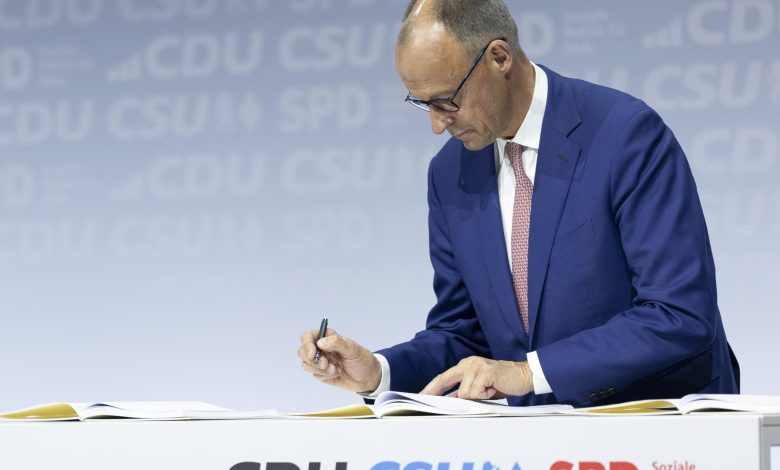Incoming German Chancellor Merz vows reforms and investments

Friedrich Merz, leader of the Christian Democratic Union (CDU), signs the coalition contract between the CDU, the CDU’S Bavarian sister party, the Christian Social Union (CSU), and the German Social Democrats (SPD) on May 05, 2025 in Berlin, Germany.
Maja Hitij | Getty Images News | Getty Images
Incoming German Chancellor Friedrich Merz on Monday vowed reforms and new investments as the country’s centrist parties signed a coalition agreement and announced additional members of the cabinet.
“Tomorrow you will get … a government that is determined to move Germany forwards with reforms and investment,” Merz said Monday ahead of the agreement being signed according to a CNBC translation.
Merz is part of the center-right Christian Democratic Union which, alongside its sister party the Christian Social Union, secured the largest shares of votes in February’s election. The center-left Social Democratic Party is also part of the new ruling coalition, having placed third in the election.
After weeks of negotiations the party leaders first presented their coalition agreement in early April before securing sign-offs from within their parties. On Monday the over 140-page deal, titled “Responsibility for Germany” was then ceremoniously signed.
Bavaria’s State Premier and Leader of the conservative Christian Social Union (CSU) Markus Soeder holds the coalition deal to form the country’s new government on May 5, 2025 in Berlin.
Odd Andersen | Afp | Getty Images
The deal covers the incoming governments plans and goals for the country, including changes to tax laws for individuals as well as businesses, migration policy and a new model for voluntary military service.
The CDU-CSU/SPD coalition had already realized a major shift in Germany’s fiscal policy before officially taking office. The package includes changes to the country’s long-standing debt rules that will allow for higher defense spending, as well as a 500-billion-euro ($567.5 billion) infrastructure and climate fund.
Additional ministers were also announced Monday, completing the incoming cabinet. Key roles include Lars Klingbeil as finance minister, Katherina Reiche as economy minister, Johann Wadephul as foreign minister and Boris Pistorius staying on as defense minister.
Klingbeil will also become vice-chancellor in the new government. He and Merz will be the key figures and decision makers, Holger Schmieding, chief economist at Berenberg, said in a note Monday.
“In the new government, Merz and the undisputed leader of the SPD, new finance minister Lars Klingbeil, will be calling the shots. What these two leaders agree will likely get done, with some occasional sniping from Bavarian CSU boss Markus Söder,” he said.
“Both Merz and Klingbeil know that their government needs to succeed to stem the rise of the right-wing AfD so that the AfD does not get close to power at the next election in early 2029.”
The far-right AfD, or Alternative fuer Deutschland, had won the second largest number of votes in this year’s election.
CDU Chairman and candidate for Chancellor Friedrich Merz (M), CSU Chairman Markus Söder (l), SPD Chairman Lars Klingbeil, designated Federal Minister of Finance and Vice Chancellor, and SPD Chairwoman Saskia Esken stand after the signing of the coalition agreement between the CDU, CSU and SPD together with other party officials and designated ministers.
Photo by Michael Kappeler/picture alliance via Getty Images
Later on Monday, outgoing Chancellor Olaf Scholz will officially be dismissed from office. Merz on Tuesday is then expected to be voted into office by Germany’s parliament. If he is confirmed as the new chancellor, he will be sworn in formally by German President Frank-Walter Steinmeier, followed by the ministers in the new cabinet.
Germany’s 2025 election took place several months earlier than originally scheduled after the previous governing coalition fell apart over disagreements about the budget, fiscal and economic policies. The tensions saw outgoing Chancellor Scholz, who is part of the SPD, sack former finance minister Christian Lindner — which in turn saw his Free Democratic Party exit the coalition.



